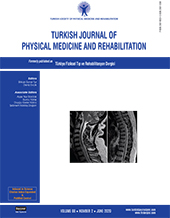Pain-diminishing and quality of life-related outcomes of Kinesio taping in patients on non-steroidal anti-inflammatory drug therapy for post-thoracotomy pain syndrome
Patients and methods: Between February 2016 and May 2017, a total 60 patients (39 males, 21 females; median age 43.5 years; range, 18 to 76 years) with PTPS were included in this single-center, prospective, randomized study. The patients were randomized into two groups based on five-day pain management protocol including NSAIDs per se (NSAID group; n=30) and NSAIDs plus Kinesio taping (NSAID-KT group; n=30) groups. Pain intensity (via visual pain scale [VAS]), neuropathic pain (Leeds Assessment of Neuropathic Symptoms and Signs [LANSS] Pain Scale), major chronic pain symptoms (via Short-Form McGill Pain Questionnaire [SF-MPQ-2]), and quality of life (via Nottingham Health Profile [NHP]) were assessed before and after five-day treatment period.
Results: In both NSAID and NSAID-KT groups, treatment was associated with a significant decrease in the VAS-pain (p<0.001), LANSS Pain Scale scores (from median 8.0 to 3.0 and from median 18.5 to 15.0, respectively, p<0.001 for each), SF-MPQ scores (p<0.001), and physical mobility and pain domains of NHS (p<0.001 for each).
Conclusion: In conclusion, our study findings indicate no additional benefit of KT application on further amelioration of long-term PTPS in patients under NSAID analgesia. Both NSAID and NSAID-KT treatments produced a significant improvement in the VAS, LANSS, SF-MPQ scores, and in the quality of life after five-day treatment.
Keywords : Kinesiotaping, long-term, non-steroidal anti-inflammatory drug, pain, post-thoracotomy pain syndrome, quality of life

















